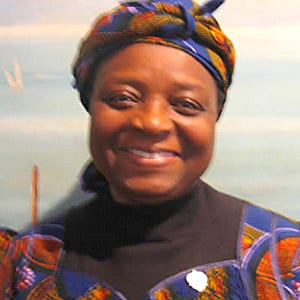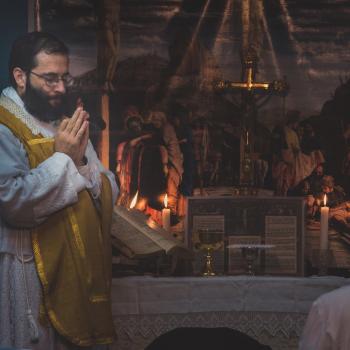
Sr. Veronica Openibo, of the Society of the Holy Child Jesus, gave an impassioned talk at the Vatican summit on sexual abuse of minors. I think a few of her points are worth sharing. If you want the whole text, Cindy Wooden of CNS posted it.
The Mission of the Church
Sr. Veronica begins with theological truths, relating them to the current crisis.
The mission of the church flows directly from our deepest understanding of the Incarnation. Catholic Christianity is grounded in belief in a God who chose to be one with the human world.
The self-understanding of the mission of the church must be a manifestation of the Christ we know as both human and divine. The whole of Christ’s mission was to reveal who God is and who we can become. This implies a total acceptance of all that is human and all that the power of God’s grace does to transform us into being witnesses of the divine. Our worldview, if Christian, must be based on respect and dignity for each human being.
At the present time, we are in a state of crisis and shame. We have seriously clouded the grace of the Christ-mission. […]
We proclaim the Ten Commandments and “parade ourselves” as being the custodians of moral standards/values and good behavior in society. Hypocrites at times? Yes! Why did we keep silent for so long? How can we turn this around for a time to evangelize, catechize and educate all the members of the church, including clergy and religious?
Abuse Is a Worldwide Issue
Having lived in different countries, Sr. Veronica has personal experience that abuse happens beyond the handful of Western countries the news has covered.
I have lived in Rome for 15 years and studied in America for three. So, I am familiar with these issues in the Global North. Probably like many of you, I have heard some Africans and Asians say, that “this is not our issue in countries in Africa and Asia; it is the problem in Europe, the Americas, Canada and Australia.”. However, I worked throughout Nigeria in the area of sexuality education for nine years and heard the stories and counselled many people. I realized how serious the issues were and still are and sharing a few of my personal experiences emphasize this fact. In the early ’90s a priest told me there were sexual abuses in the convents and formation houses and that, as president of the Nigeria Conference of Women Religious, I should, please, do something to address the issue.
Radical Transparency
Sr. Veronica called for radical transparency in order to fight past tendencies to hide.
Too often we want to keep silent until the storm has passed! This storm will not pass by. Our credibility is at stake. Jesus told us, “Whoever causes one of these little ones who believe (in me) to sin, it would be better for him if a great millstone were put around his neck and he were thrown into the sea” (Mark 9:42). We must face this issue and seek healing for the victims of abuse. The normal process for clergy — in the past and still in the present in some areas — was/is to give support to “one of us,” to avoid exposing a scandal and bringing discredit to the church. All offenders, regardless of their clerical status, found guilty should be given the same penalty for the abuse of minors. […]
We must build more effective and efficient processes, based on research in human development as well as civil and canon law, for the safeguarding of minors. Then clear and comprehensive safeguarding policies and guidelines in every diocese should be placed visibly in various parish offices and published on the internet. There must be better handling of the cases through face-to-face, transparent and courageous conversations with both victims and offenders, as well as investigating groups.
No Abuser Should Be Exempt
Pushing for transparency, she wants to make sure we don’t exempt some.
The excuse that respect be given to some priests by virtue of their advanced years and hierarchical position is unacceptable. This argument states that many of the criminal offenders are old, some no longer alive, and that we should not hurt them or their reputations by taking away their priesthood in old age. We can feel sad for those who, when they were younger committed offenses that are now being brought out to the open. But my heart bleeds for many of the victims who have lived with the misplaced shame and guilt of repeated violations for years.
Practical Solutions Begin by Helping Abuse Victims
Sr. Veronica also offers some ideas going forward.
It is becoming evident that for many victims being listened to and helped psychologically and spiritually it was the beginning of a healing process. Can we train enough sensitive and compassionate people to offer this service in all countries including those places struggling to put food on the table? Are there ways of helping parishes heal victims using their traditional wisdom? Do we make use of preaching and other means to address sexual issues in society? How might dioceses share in a strategic way in providing culturally-sensitive education programs and training kits? Such materials, respecting the dignity of the human persons and emphasizing unacceptable behaviors, could be used in parishes and schools, hospitals and other places of pastoral ministry. […]
Essential, surely, is a clear and balanced education and training about sexuality and boundaries in the seminaries and formation houses; in the ongoing formation of priests, religious men and women and bishops. It worries me when I see in Rome, and elsewhere, the youngest seminarians being treated as though they are more special than everyone else, thus encouraging them to assume, from the beginning of their training, exalted ideas about their status. […]
Could each diocese be challenged to gather men and women of integrity: laity, including religious, and clergy, to form a joint commission sharing expertise about the documentary procedures and protocols, the legal and financial implications of allegations and the necessary channels of responsibility and accountability? A well-qualified person — lay, religious or priests — is likely to be the best chairperson of such a group.
Conclusion: Going Forward
Sr. Veronica ends on hope.
I hope and pray that at the end of this conference we will choose deliberately to break any culture of silence and secrecy among us, to allow more light into our church. Let us acknowledge our vulnerability; be proactive not reactive in combating the challenges facing the world of the young and the vulnerable, and look fearlessly into other issues of abuse in the church and society.
I recommend reading Sr. Veronica’s whole talk.
I think we too should look forward with hope. This summit gathered experts on one of the issues in the Church: abuse of minors. It seems that on this focused topic, it may provide a good framework. Hopefully, it will also spur the Church to address similar issues like seminarian abuse. (Sr. Veronica mentioned a similar issue: abuse in the formation houses of female religious.) J.D. Flynn pointed out that the abuse of a 17 or 18-year-old has similar moral issues, even if legal ones change. Hopefully, many will see this connection so we can move on to other abuse. The Church must respond to all abuse. This is a step forward that can give us hope, but we are still far from the end.
Note: like all Catholic media, I rely on donations to support what I post. Patheos leaves this up to each writer so you can help support me via Patreon.












